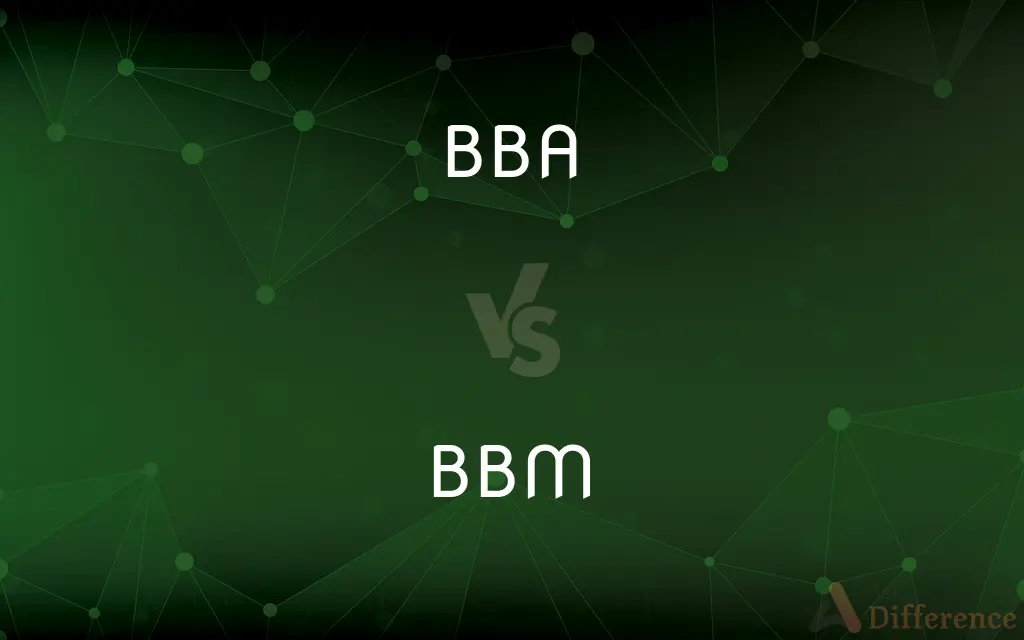BBA vs. BBM — What's the Difference?
By Tayyaba Rehman — Published on November 8, 2023
BBA (Bachelor of Business Administration) is a degree focused on various business aspects, while BBM (Bachelor of Business Management) emphasizes specialized management skills.

Difference Between BBA and BBM
Table of Contents
ADVERTISEMENT
Key Differences
The BBA, or Bachelor of Business Administration, is a degree program that offers a broad overview of the functional aspects of a company across various domains like finance, human resources, and marketing. In contrast, the BBM, or Bachelor of Business Management, tends to focus more on developing in-depth managerial skills and leadership qualities.
BBA programs are designed to give a comprehensive understanding of all the core business disciplines, preparing graduates for a wide range of business-related careers or advanced studies. The BBM, however, is structured to provide more hands-on managerial training, which includes problem-solving, leadership, and decision-making skills.
The BBA degree often includes coursework that is theoretical and practical in nature, aiming to build a solid foundation of business knowledge. On the other hand, BBM courses usually focus on specific case studies and practical managerial experiences, aiming to develop the strategic thinking necessary for management roles.
Students in BBA programs might find a more generalized approach to business education, with opportunities to specialize later in the course. Whereas, BBM students often dive into management techniques and styles from the onset, focusing on the skills needed to lead teams and manage departments.
BBA graduates are well-equipped for various entry-level positions across many industries or further educational pursuits like an MBA. BBM graduates, however, with their specialized training, are typically better suited for managerial roles right after graduation.
ADVERTISEMENT
Comparison Chart
Focus
Broad business concepts
Specialized management skills
Course Structure
Theoretical and practical business knowledge
Case studies and practical managerial experiences
Skill Development
General business skills
Leadership and decision-making skills
Post-Graduation
Prepared for a wide range of careers or further education
Suited for immediate managerial roles
Specialization
Later in the course
From the onset
Compare with Definitions
BBA
BBA covers various areas of business like finance, marketing, and operations.
The BBA program provided insights into different business domains.
BBM
BBM focuses on management techniques and leadership qualities.
During his BBM, Alex developed strong managerial skills.
BBA
BBA is an undergraduate degree in business principles.
John enrolled in a BBA program to learn about business principles.
BBM
BBM emphasizes the strategic aspect of managing a business.
The BBM course highlighted the importance of strategic thinking.
BBA
BBA prepares students for diverse business careers.
After her BBA, she had multiple job offers in various industries.
BBM
BBM courses involve practical case studies and problem-solving scenarios.
His BBM program had him tackling real-world business problems.
BBA
BBA can be a stepping stone to advanced studies like an MBA.
He pursued a BBA with the goal of eventually obtaining an MBA.
BBM
BBM prepares students specifically for managerial roles.
After completing her BBM, she was ready to lead a team.
BBA
BBA programs often include a mix of theory and practical business studies.
Her BBA program included both coursework and internships.
BBM
BBM is an undergraduate degree focusing on various aspects of business management.
Sara chose BBM to learn about different facets of business management.
Common Curiosities
What kind of courses are common in BBA programs?
BBA courses cover a range of business topics, including marketing, finance, and human resources.
Can a BBA degree lead to managerial roles?
Yes, a BBA can lead to managerial roles, often after gaining some experience or further education.
What's the main focus of a BBA degree?
BBA provides a broad understanding of various business functions and principles.
How does a BBM degree differ in focus from a BBA?
BBM focuses more on developing specific management and leadership skills.
Is a BBM degree more specialized than a BBA?
Yes, BBM tends to focus more on management-specific skills from the beginning.
Is BBA a globally recognized degree?
Yes, BBA is a globally recognized undergraduate business degree.
Are practical experiences a part of BBM programs?
Yes, BBM programs often include case studies and real-world problem-solving.
What industries can BBM graduates work in?
BBM graduates can work in various industries, anywhere that requires strong management skills.
Do BBM programs require internships?
Many BBM programs encourage or require internships for practical experience.
How long does it typically take to complete a BBM program?
A BBM program usually takes about three to four years to complete.
Do BBA graduates need further education to get into management?
Not necessarily, but further education like an MBA can enhance opportunities and advancement.
Can a BBA graduate pursue a career in finance?
Yes, BBA programs provide a foundation that can lead to careers in finance.
Is BBM more suitable for someone with leadership aspirations?
Yes, BBM focuses on leadership and management skills essential for such roles.
What's the value of a BBA degree in the job market?
A BBA is valuable as it offers broad business knowledge, suitable for various entry-level positions.
Are there online programs available for BBA and BBM degrees?
Yes, many institutions offer online BBA and BBM programs.
Share Your Discovery

Previous Comparison
Gmail Account vs. Google Account
Next Comparison
2 Star Hotel vs. 3 Star HotelAuthor Spotlight
Written by
Tayyaba RehmanTayyaba Rehman is a distinguished writer, currently serving as a primary contributor to askdifference.com. As a researcher in semantics and etymology, Tayyaba's passion for the complexity of languages and their distinctions has found a perfect home on the platform. Tayyaba delves into the intricacies of language, distinguishing between commonly confused words and phrases, thereby providing clarity for readers worldwide.












































